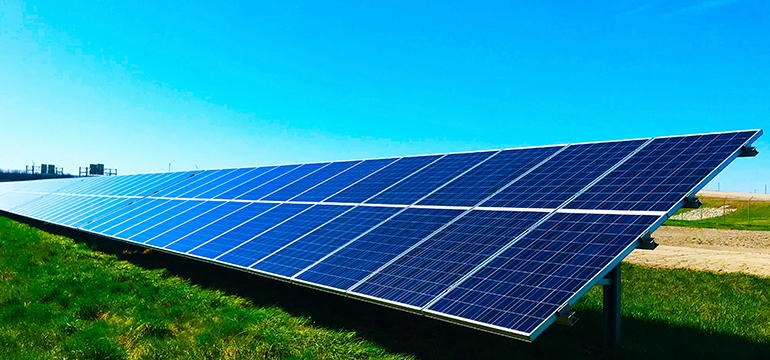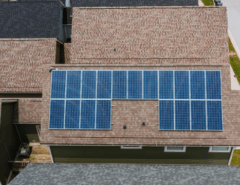When thinking about investing ₹2 lakhs in India, many people consider a fixed deposit (FD) as a safe option. But what if the same ₹2 lakhs is used for a small solar power plant? The returns are not only higher but also practical. It helps to reduce bills, offer independence, and secure long-term benefits. Let us compare both options in terms of returns, utility, and value.
Fixed Deposit: What to Expect
Right now, most leading banks in India offer fixed deposit (FD) rates of about 6.25% to 7% per year for a period of one to two years. Senior citizens often receive a slightly higher rate, usually around 0.25% to 0.50% extra.
If you put ₹2,00,000 in an FD at 6.5% for one year, you can expect to earn around ₹13,000 in interest before taxes. With compounding over several years, the returns may increase a little. But overall, the growth stays steady and predictable, with no extra advantages.
An FD is considered a safe option since the principal amount is secure and the returns are guaranteed. However, early withdrawal usually comes with a penalty. This makes liquidity moderate. Also, the interest earned on FDs is taxable.
What ₹2 Lakhs Gets You if You Invest in a Solar Power Plant
If you invest ₹2 lakhs in a rooftop solar for home system, here’s what it means in practical terms:
-
- System Size & Cost
With about ₹2.1 lakhs (just above ₹2 lakhs), you can install a 3 kW system of rooftop solar for a home without subsidy. This is the cost of an on-grid system without batteries. Central and state government subsidies can significantly lower this upfront cost. - Electricity Generation & Monthly Savings
A 3 kW rooftop solar power plant produces about 300–360 units of electricity per month. These numbers depend on sunlight and location. So, if the electricity tariff is ₹7–₹8 per unit, you save about ₹2,500–₹3,000 every month. - Payback Period
With those savings, your ₹2 lakh investment can be recovered in just 3 to 4 years. After this period, the electricity you generate and use is almost free, apart from minor maintenance costs. Since a rooftop solar system lasts for 25 years or more, it continues to provide you with decades of reliable savings.
- System Size & Cost

Comparing Returns & Utility
| Feature | Fixed Deposit (₹2 Lakhs) | Solar Power Plant (₹2 Lakhs) |
|---|---|---|
| Annual return | ₹12,000 to ₹14,000 | ₹30,000 to ₹36,000 in bill savings |
| Payback | Not applicable | 3 to 4 years |
| Lifespan | 1–10 years (renew as needed) | Up to 25 years |
| Utility | Only financial | Energy savings, lower bills, independence |
| Risk | Very low | Minor maintenance, panel degradation |
Some other benefits of solar beyond returns include:
- Electricity prices tend to rise over time. If your tariff rises, savings from solar become more valuable as you can save money.
- Many Indian states offer subsidies or capital assistance for rooftop solar. Net metering allows you to send excess power back to the grid. This can improve ROI and further reduce bills.
- Solar panels require minimal care and degrade very slowly, less than 0.5% per year.
- Besides financials, solar cuts your carbon footprint and supports clean energy adoption in India.
The Real Value of ₹2 Lakhs
If you invest ₹2 lakh in an FD, it will give you safe returns of about 6–7% per year, which is around ₹12,000–₹14,000 annually. If you do not reinvest elsewhere, this adds up to about ₹70,000 before taxes in five years.
On the other hand, if you install a rooftop solar system for a home, it lets you produce your own electricity and save about ₹30,000 to ₹36,000 each year. You recover the cost in 3 to 4 years and then keep saving for decades.
How Does Mahindra Solarize Help?
At Mahindra Solarize, we help homeowners and businesses set up reliable solar power systems with transparent cost breakdowns. We provide high-quality components and good after-sales support. If you are considering investing ~₹2 lakhs, we can show you what size solar power plant you can install in your location. We will also assist you regarding the subsidies you may be eligible for and the payback period. Our goal is to make solar power accessible, efficient, and beneficial not just in ROI, but in independence and energy security.
Lastly, a fixed deposit is safe, but its growth is limited. A system of rooftop solar for homes not only delivers higher returns but also reduces electricity bills. It gives you independence from rising tariffs and provides clean energy for years. For Indian households, choosing solar with an investment of ₹2 lakhs can be the smarter option.
#solar power plant #rooftop solar for home


